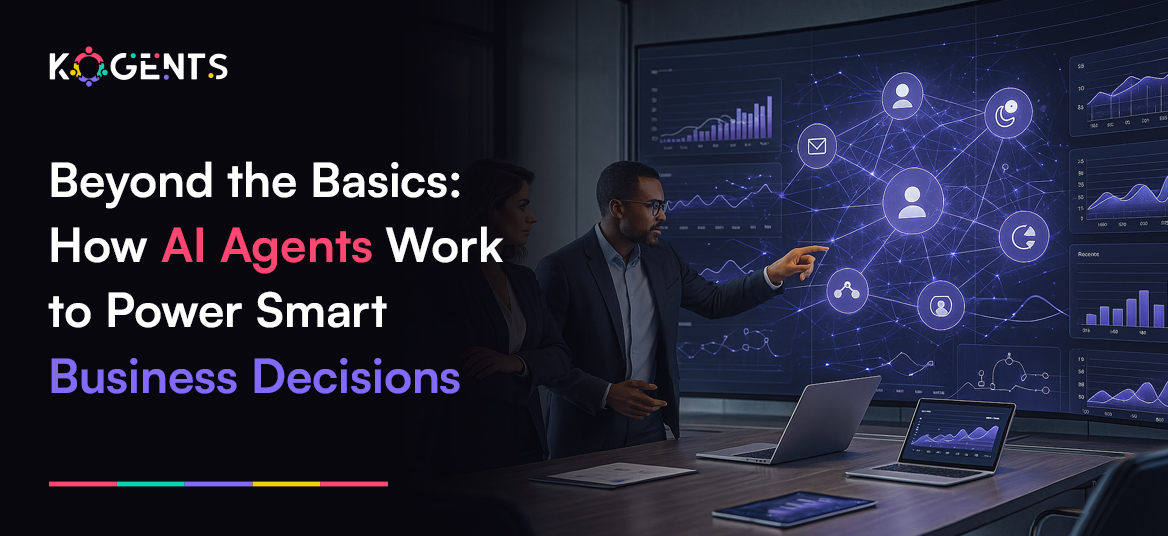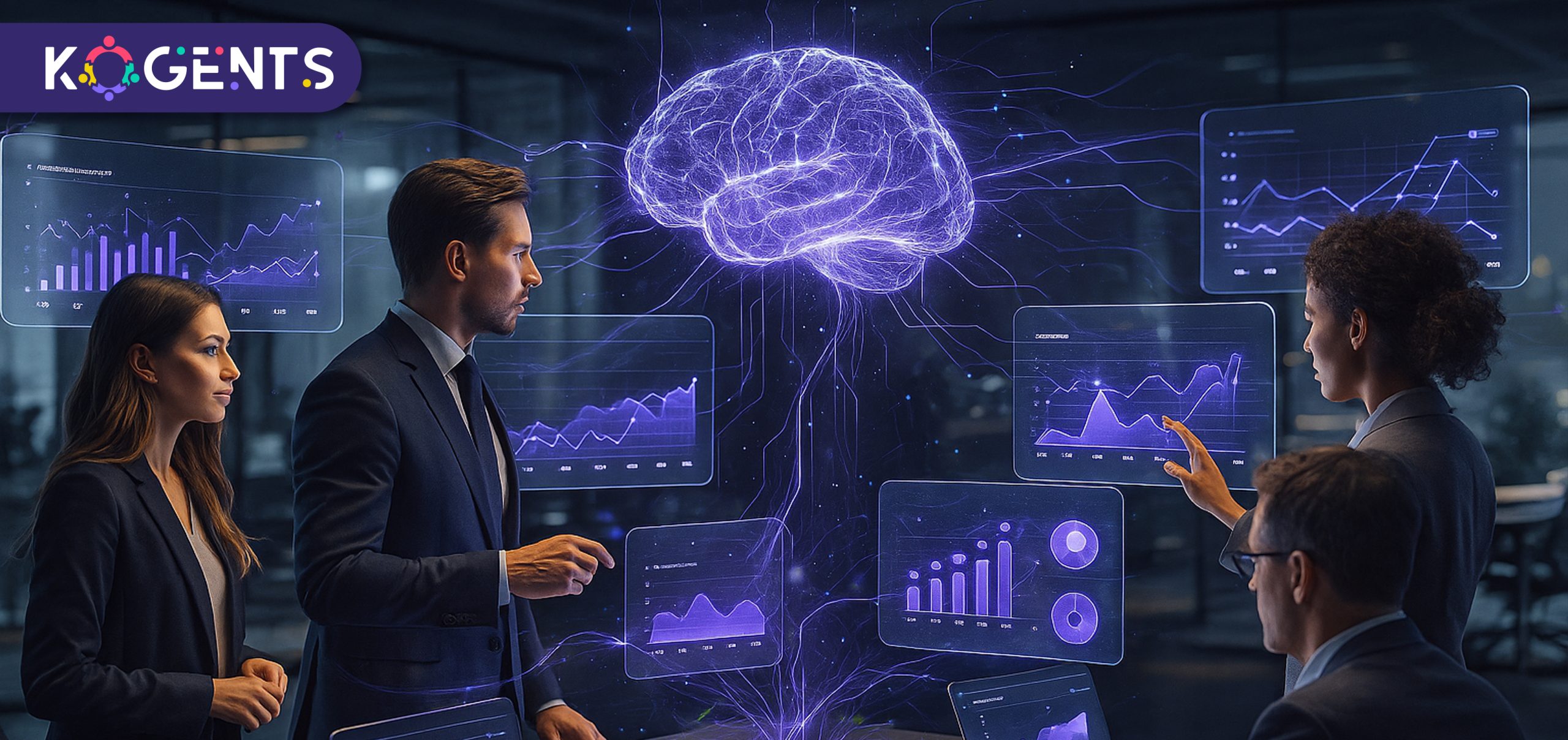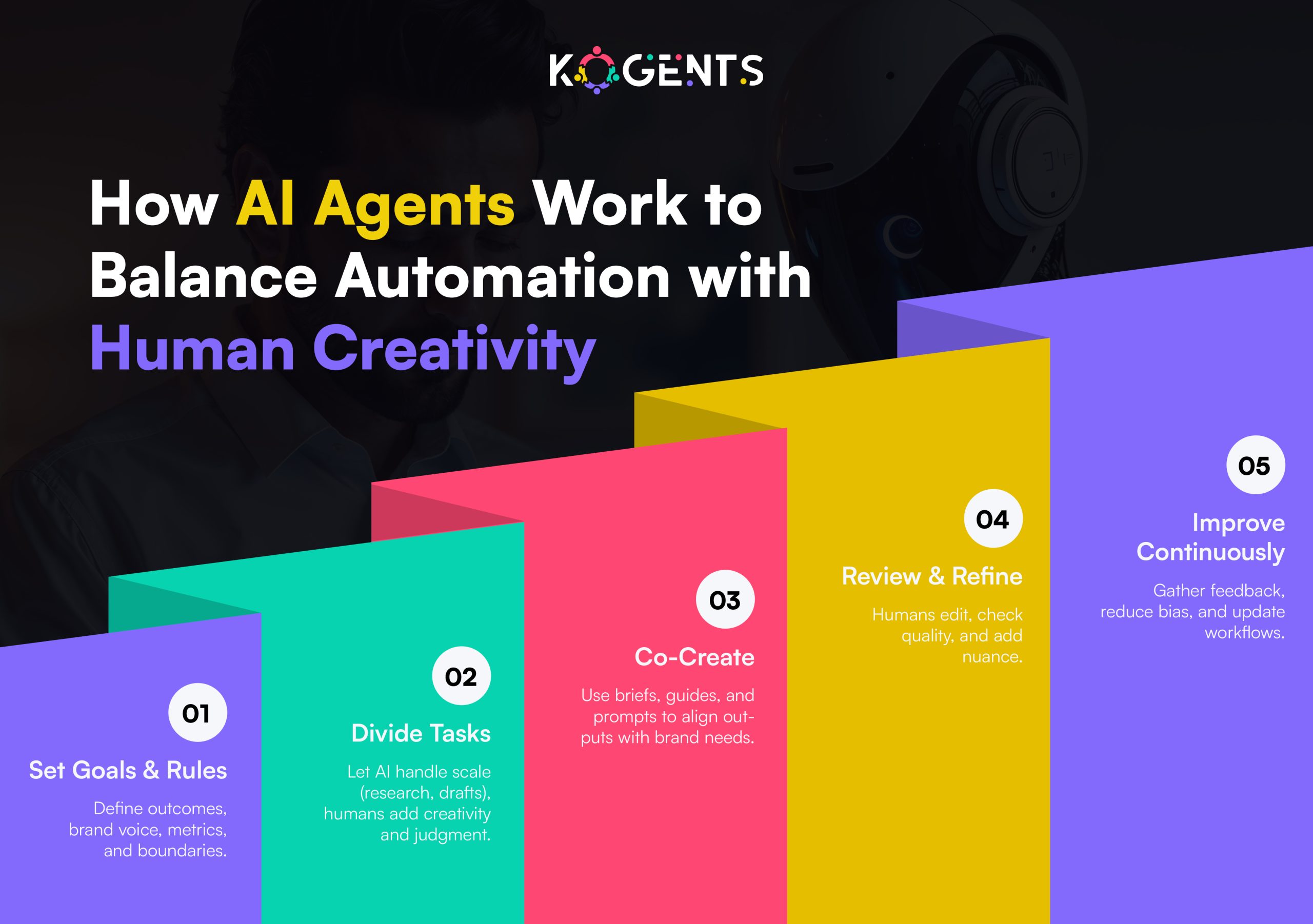Beyond the Basics: How AI Agents Work to Power Smart Business Decisions

Summary:
Understanding how AI agents work is no longer a topic for data scientists alone; it’s a necessity for forward-thinking business leaders.
Unlike traditional software tools, these agents mimic aspects of human cognition; they perceive, decide, and act autonomously in pursuit of defined goals.
This makes them invaluable for making smart business decisions in areas like customer service, sales forecasting, and product strategy.
In this blog, we’ll break down how intelligent agents function, why they matter for entrepreneurs and solopreneurs, their architecture, real-world use cases, challenges, and the future of AI-driven decision-making.
By the end, you’ll see why AI agents are not just another tech buzzword but a practical investment in your competitive advantage.
Key Takeaways
- AI agents go beyond automation; they perceive, learn, act, and adapt.
- For entrepreneurs & solopreneurs, they provide scale without cost bloat.
- They enable smarter, faster, data-backed decisions.
- Use cases span customer service, finance, marketing, and operations.
- Limitations exist, but with oversight, agents become powerful decision partners.
What Are AI Agents?
At their core, AI agents are systems that perceive their environment, process information, and take actions to achieve specific goals.
The simplest analogy is a personal assistant who listens, understands context, and acts, but is powered by algorithms instead of intuition.
Technically, an AI agent architecture consists of:
- Perception: Sensors (digital inputs like data feeds, APIs, or text) that allow the agent to observe the environment.
- Decision-Making: Cognitive models, like belief-desire-intention (BDI) frameworks, that weigh options and align actions with goals.
- Action: Outputs that interact with the environment, whether generating insights, automating tasks, or triggering workflows.
- Learning: Feedback loops (reinforcement signals, machine learning models) that help agents improve over time.
There are multiple types of AI agents, and how they work differs:
- Rule-Based Agents: Follow fixed instructions.
- Learning Agents: Adapt using reinforcement learning and experience.
- Cognitive Agents: Simulate reasoning with complex goals.
- Multi-Agent Systems: Collaborate like a team of specialists.
Note: Unlike chatbots that follow scripts, AI agents operate autonomously, dynamically updating their strategies as they process new data.
Why Entrepreneurs & Solopreneurs Need AI Agents?
Entrepreneurs and solopreneurs often juggle multiple hats: CEO, marketer, strategist, and customer support.
Every hour counts, and every decision carries weight. This is where AI agents prove indispensable.
- Decision Velocity: Markets move fast. AI agents analyze real-time data, social trends, sales performance, and competitor moves, helping you react swiftly.
- Resource Optimization: For solopreneurs with lean teams, AI agents can act as scalable assistants, handling repetitive tasks like customer queries, lead scoring, or scheduling.
- Cost Efficiency: Instead of hiring multiple specialists, you can deploy AI-driven systems that scale with your business without ballooning payroll.
- Data-Driven Confidence: Instead of gut-feel, agents provide evidence-based recommendations by connecting dots across datasets.
- Customer-Centricity: Intelligent agents personalize experiences at scale, whether tailoring product suggestions or optimizing support interactions.
Know It: For entrepreneurs running startups, agents can forecast cash flow, evaluate funding strategies, and identify growth channels.
If you can harness them early, you set the foundation for scalable, smarter business decisions without burning out or overspending.

How AI Agents Work to Power Smart Business Decisions?
So, how do AI agents actually transform decision-making? Let’s break down their working principle:
- Environment Interaction
- Agents continuously gather signals from customer interactions, financial data, or supply chain metrics.
Example: An e-commerce AI agent monitors website clicks, cart abandonment, and competitor pricing.
- Perception-Action Loop
- This is the core cycle of how AI agents work.
- Perception: Detect trends or anomalies (e.g., sales dip).
- Decision-Making: Evaluate potential strategies (discounts, campaigns, inventory shift).
- Action: Implement changes (launch a campaign, reorder stock).
- This is the core cycle of how AI agents work.
- Learning Through Reinforcement
- Agents receive reinforcement signals, success or failure feedback.
Example: If discounts boost sales but cut margins, the agent learns to balance volume vs. profitability.
- Cognitive Reasoning
- Advanced agents use cognitive architectures like the BDI model to align short-term tasks with long-term business objectives.
Example: Deciding whether to expand product lines vs. improving existing ones.
- Multi-Agent Collaboration
- AI multi-agent systems mirror team dynamics, agents specialize and collaborate.
Example: One agent predicts customer churn, another optimizes ad spend, and a third adjusts pricing, all coordinating toward maximizing ROI.
Core Features of Modern AI Agents in Empowering Business Decisions
Modern AI agents bring features that go beyond automation. Here’s what makes them business powerhouses:
- Autonomy: Operate independently with minimal oversight.
- Adaptability: Learn and adjust from new data without reprogramming.
- Scalability: Handle thousands of simultaneous interactions (support tickets, customer emails).
- Contextual Awareness: Understand not just data points, but context—e.g., why sales dropped after a campaign.
- Predictive Modeling: Forecast demand, churn, or cash flow using machine learning agents.
- Goal-Oriented Behavior: Work toward defined KPIs, like maximizing revenue or customer satisfaction.
- Integration: Connect with tools like CRMs, ERPs, and marketing platforms.
- Explainability: Advanced systems provide reasoning for decisions—building trust.
These features collectively allow businesses to:
- Identify opportunities earlier (new markets, high-value customers).
- Mitigate risks faster (supply chain disruptions, financial downturns).
- Personalize experiences deeply (tailored offers, adaptive learning paths).
| For solopreneurs, imagine having an “AI partner” that not only schedules meetings but proactively flags when a client may churn, complete with recommended actions.
For entrepreneurs, agents can simulate multiple business scenarios using agent-based modeling, allowing leaders to test strategies before committing resources. |
Use Cases for Entrepreneurs, Solopreneurs & Businesses
Examples of AI agents in action:
Customer Service Agents:
Automate support via intelligent chat systems, freeing founders to focus on growth.
Sales Forecasting Agents:
Predict demand trends, helping startups adjust inventory and pricing strategies.
Financial Agents:
Monitor expenses, suggest budgeting adjustments, and flag unusual transactions.
Marketing Agents:
Optimize ad spend across platforms, A/B test campaigns, and suggest content strategies.
Operational Agents:
Manage logistics, supply chain reordering, vendor management, and shipping optimization.
Benefits of AI Agents in Empowering Smart Business Decisions
Key Benefits:
- Smarter Decisions: Analyze complex datasets to provide actionable insights.
- Time Savings: Automate repetitive, low-value tasks.
- Cost Efficiency: Reduce overhead by replacing manual analysis.
- Personalization: Tailor customer interactions at scale.
- Risk Reduction: Proactively detect fraud, anomalies, or inefficiencies.
- Strategic Clarity: Provide scenario analysis and “what-if” simulations.

| For entrepreneurs, this translates to strategic focus: less time crunching spreadsheets, more time building customer relationships.
For solopreneurs, it means scalability without burnout: operating like a team of five, with just one. |
Challenges & Limitations of AI Agents
Despite their promise, AI agents aren’t flawless.
- Data Dependency: Without clean, sufficient data, agents may produce weak insights.
- Bias Risks: Agents can inherit biases from training data, leading to skewed decisions.
- Integration Complexity: Connecting with legacy systems or scattered platforms can be resource-intensive.
- Explainability Issues: Black-box models may limit trust among decision-makers.
- Cost of Implementation: High-quality AI agents may require an upfront investment.
Catch Point: Entrepreneurs should view agents as decision partners, not decision makers. Human oversight ensures ethical, contextual, and strategic alignment.
AI Agents in Business Decisions vs Other Tools
| Feature/Aspect | AI Agents | Traditional Analytics Tools | RPA (Robotic Process Automation) | Chatbots |
| Decision-Making | Goal-driven, autonomous, adaptive | Human-led, data-driven only | No decision-making | Limited, scripted |
| Learning | Self-improving via reinforcement | Static, requires manual updates | None | None |
| Context Awareness | High (perception-action loop, environment) | Low–medium | None | Very low |
| Scalability | Handles complex, multi-agent collaboration | Limited by human bandwidth | Process-specific | Interaction-limited |
| Use Case Fit | Smart decisions across multiple functions | Reports, dashboards | Repetitive task automation | Customer Q&A only |
Future of AI Agents
The future of AI agents lies in cognitive collaboration, systems that not only analyze but also co-create strategy with entrepreneurs.
- Greater Explainability: Transparent decision logs for trust.
- Seamless Integration: Agents embedded in SaaS tools and platforms that solopreneurs already use.
- Ethical Guardrails: Built-in fairness, bias detection, and compliance.
- Multi-Agent Synergy: Teams of agents collaborating across marketing, finance, and operations.
- Human-AI Co-Decisioning: Entrepreneurs as strategists, agents as executors.
Take A Scenario:
Imagine your AI agent not only forecasting demand but also negotiating vendor contracts, optimizing ad spend, and suggesting product pivots, all while explaining why.
This is how AI agents will power smart business decisions in the coming decade, by being strategic copilots, not just assistants.
Case Study 1: DeepMind’s AI Agents in Energy Management
DeepMind partnered with Google Data Centers to apply reinforcement learning agents that managed cooling systems.
By autonomously adjusting controls, the agents reduced energy usage by 40%.
This wasn’t just cost-saving; it aligned with sustainability goals, showing how AI agents in real-world environments deliver strategic, ethical, and financial wins.
Startup Case Study 2: AutoGPT for Solopreneurs
AutoGPT, an open-source cognitive agent framework, empowered a solopreneur running a digital marketing agency. The agent autonomously:
- Researched keywords.
- Drafted blog content.
- Scheduled campaigns led to a reduced workload by 60%, allowing the founder to focus on client acquisition.
The End!
AI agents represent the future of decision-making—autonomous, adaptive, and aligned with business goals.
For entrepreneurs and solopreneurs, they are more than tools; they are scalable partners capable of turning raw data into strategic insights.
The key is not just knowing how AI agents work, but how to deploy them effectively in your business.
As we’ve seen, from energy efficiency to customer retention, AI agents already power smarter decisions across industries.
This is where Kogents.ai comes in. Designed for entrepreneurs, solopreneurs, and growing businesses, Kogents offers tailored AI solutions that integrate seamlessly into your workflows.
Whether you’re looking to forecast sales, optimize campaigns, or automate operations, “kogents ai” empowers you to scale smartly, without the overwhelm. So, call us at (267) 248-9454 or drop an email at info@portal.kogents.ai today.
FAQs
What are AI agents, and how do they work?
AI agents are intelligent systems that perceive their environment, process data, and take actions toward specific goals. They operate through a perception-action loop, collecting information, analyzing it, making decisions, and executing tasks. Over time, they improve using reinforcement learning and feedback loops, which makes them more adaptive than traditional software.
What is the difference between AI agents and chatbots?
Chatbots are usually scripted tools that follow conversational flows, whereas AI agents are autonomous decision-makers. A chatbot answers FAQs; an AI agent could analyze customer sentiment, escalate complex cases, and recommend strategic actions.
Explain how reinforcement learning agents function?
Reinforcement learning agents learn through trial and error. They perform actions in an environment, receive positive or negative signals (rewards or penalties), and adjust future strategies. For example, an RL agent in marketing tests ad placements, learns which perform best, and reallocates budgets automatically.
How do multi-agent systems work in AI?
Multi-agent systems involve multiple AI agents working collaboratively. Each agent specializes in a task, but they communicate and coordinate, like a team of mini CEOs. In supply chain management, one agent may forecast demand, another manage inventory, and another optimize delivery routes.
Explain how the OpenAI agents work?
OpenAI research highlights that AI agents function through goal-driven behavior, perception of inputs, and adaptive decision-making. Tools like AutoGPT (built on GPT models) show how agents can perform multi-step reasoning and task execution autonomously.
Name the Best AI agent platforms to build with?
Popular platforms include:
- LangChain (AI workflows).
- AutoGPT (autonomous task execution).
- BabyAGI (lightweight cognitive agents).
- SPADE (multi-agent simulation).
Entrepreneurs can use these to build tailored AI agents for marketing, finance, or operations.
Can you draw a comparison between an AI agent and an RPA?
While RPA (Robotic Process Automation) automates repetitive tasks (like form filling), AI agents are adaptive decision-makers. RPA follows scripts; AI agents perceive context, learn from data, and optimize strategies dynamically. They complement, but don’t replace, each other.
Which companies offer AI agent solutions?
Leading companies include OpenAI, DeepMind, and Meta AI, along with startups like Kogents.ai, which specializes in entrepreneurial and business-focused AI agents. Each offers tools ranging from enterprise-scale solutions to solopreneur-friendly platforms.

Kogents AI builds intelligent agents for healthcare, education, and enterprises, delivering secure, scalable solutions that streamline workflows and boost efficiency.